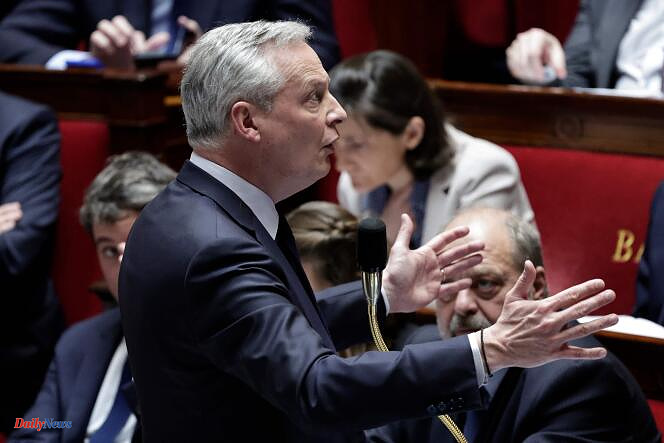The government reassessed its deficit forecast to 5.1% of gross domestic product (GDP) for 2024, instead of the 4.4% hoped for, in the new stability program unveiled by the Ministry of Finance on Wednesday April 10. According to Bercy forecasts, the public deficit should return to 2.9% in 2027.
Enough to make part of the opposition fear “a hidden plan on French taxes”, while the majority is torn over the course of action to follow in the face of the spiraling public deficit.
It had already seriously slipped to 5.5% instead of the 4.9% forecast in 2023, mainly due to lower revenues than expected. Last week, on The Parliamentary Channel (LCP), the general budget rapporteur at the National Assembly, Jean-René Cazeneuve, judged it “very likely that the objective of 4.4% in 2024 would no longer be at all 'intended objective' in the new programme.
In February, to urgently restore the situation, the Minister of Economy and Finance, Bruno Le Maire, announced ten billion euros in savings on the state budget this year: this is the maximum which could be cut by decree, without having to go through a amending finance law in Parliament.
According to information from Les Echos, confirmed to Agence France-Presse, Mr. Le Maire sent several parliamentarians a message this weekend with a view to implementing such an amending finance law. But this initiative greatly displeased the President of the Republic, Emmanuel Macron, and the Prime Minister, Gabriel Attal, who are not on this line.
“There will be no tax increase”
Without being able to take more drastic saving measures than the 10 billion, it would be logical that the deficit will only be reduced very little this year, while growth is only expected at 1%. For 2025, the government has already announced 20 billion in savings across all three areas (State, Social Security, communities).
The communities seem recalcitrant and explained to Mr. Le Maire on Tuesday, during a meeting in Bercy, that they had already “given largely”. There is also still no question of increasing taxes to fill the hole, as Gabriel Attal and Bruno Le Maire repeated in unison on Tuesday during questions to the government in the National Assembly. “There will be no tax increase on the French, the trick is a bit big in trying to make people believe the opposite,” said Mr. Attal to LR boss Eric Ciotti who denounced “a hidden plan” tax increases.
“We do not want to increase taxes on the French, not to “give gifts to the rich” but because fiscal stability allows businesses to invest, create jobs, and revive French economic power,” said Mr. The mayor. Mr. Attal, however, launched last week a parliamentary “task force” responsible for making proposals to tax “rents”, a concept still to be defined.
Enough to encourage part of the opposition to denounce the government's double discourse. “We already know that the government lied [...] for the 2024 budget, we have the feeling that it is still lying to us about the measures it intends to propose,” Olivier Marleix, president of the group, said on Wednesday. The Republicans in the National Assembly, on Franceinfo.
The Mayor predicts “a powerful economic boost in 2025 and 2026”
“A budget is like a barbecue, you have a guy who does it and then everyone around who gives their opinion,” quipped the former Minister of Transport, Clément Beaune, on France 2 on Wednesday, for whom “it there is no need to raise fears. »
To reduce the public deficit ratio, the government, in addition to savings and the taxation of rents, only has to hope that the denominator of the public deficit, that is to say GDP, increases sharply in the coming years. years. Bercy so far forecasts growth of 1.7% for 2025 and 2026, and 1.8% in 2027.
Last week, Bruno Le Maire predicted in front of entrepreneurs “a real powerful economic boost in 2025 and 2026”. After the disclosure of its main hypotheses on Wednesday, it will be presented to the Council of Ministers on April 17, and debated in Parliament on April 29 and 30, announced the Minister of the Budget, Thomas Cazenave, and Bruno Le Maire.












